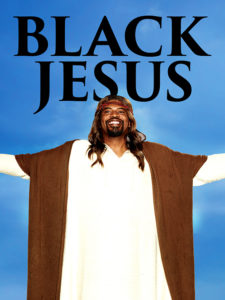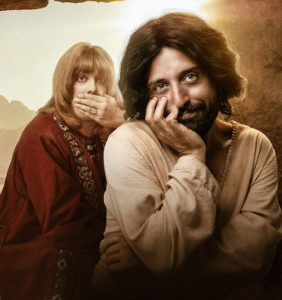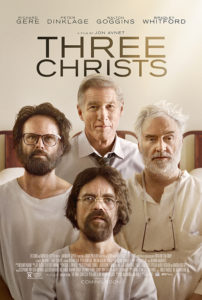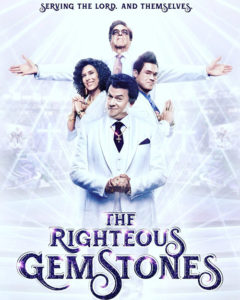Celluloid Jesus
While humanists eschew Jesus as the divine son of God who died on a cross because Eve got smart and people are prone to suck, we can’t deny that Jesus is having a moment on screen. The past few months have seen a slew of new series or season premieres on network television or streaming services in which Jesus figures as a character, often the main one. Considering the power of pop culture and entertainment today (and because we all need momentary breaks from US politics and global health), we bring you a survey of the current savior fare.
 Black Jesus (on Adult Swim; third season premier: September 2019)
Black Jesus (on Adult Swim; third season premier: September 2019)
Picture this. Jesus is your next-door neighbor in Compton, California. A dark-skinned man with a charming smile and what seems to be permed hair, he asks you to follow him and “the homies” (very disciple-like). The followers of “Black Jesus” are an exciting bunch, based on light and comical archetypes. Bonnie the lazy loser, Trayvon the nerd, Maggie the social media-obsessed gossip, and Fish the ex-con. What a combination.
The show follows Black Jesus, portrayed by Gerard “Slink” Johnson, and his small group of followers on a mission to spread “God’s love” and kindness. Black Jesus convinces the followers that the best way to spread this love is through a “community garden.” The viewer notices later on in the show that God’s love is a euphemism for the growing and distribution of cannabis. Unlike the way people view Jesus Christ of the Bible, Black Jesus doesn’t have a perfect track record, and neither do his followers. And yet he always gets the bigger concepts. Leading by example, Black Jesus comically navigates questions of ethics and morality, such as standing up against a pastor who’s conning his congregations in the episode, ” Jesus vs. Church of Compton.” Throughout the series, Black Jesus is attacked by non-followers who want him to stop spreading the love in their community and questioning his “Jesus-ness.” What we ultimately end up noticing is that Black Jesus is just like us, flaws and all, and maybe it’s not too much of a stretch to say “in his image.”
 Bless the Harts (Fox; premiered September 2019)
Bless the Harts (Fox; premiered September 2019)
Bless the Harts is a cartoon series about a working-class family in North Carolina struggling to make ends meet due to bad luck and bad decisions, but always supporting each other through the challenges. Set in the King of the Hill universe, the show pays homage to creator Emily Spivey’s hometown of High Point, North Carolina. Kristen Wiig voices main character Jenny Hart, with Jillian Bell as her daughter Violet Hart; Maya Rudolph as her mother, Betty Hart; Ike Barinholtz as her boyfriend Wayne; and Kumail Nanjiani as her best friend Jesus. Yes, Jesus Christ.
Jesus appears to Jenny by coming out of a mural at The Last Supper restaurant and acts as her conscience, giving her advice in a non-judgmental way while still casually reminding her that he’s an all-knowing deity. Spivey explained in an Entertainment Weekly interview that she knew she wanted to incorporate Jesus in the show “because in the south, Jesus is everywhere. Even if you’re not a churchgoer, he’s just everywhere.” She created the character with her sister, a Methodist minister, and brother-in-law, who’s a professor of theology. “I was like, what would Jesus say if you asked, ‘Can I pray for money?’ I just thought, comedically, it could be very fun for Jenny to be bouncing stuff off actual Jesus.” Spivey also explained that Jesus really is there with Jenny, as in he’s not a figment of Jenny’s imagination. Fans can look forward to seeing more of Nanjiani’s Jesus since the show was renewed for a second season. (If you’re interested in more adult animation depictions of Jesus, check out Bubble Blabber’s ten funniest. Bless the Harts was ranked #2.)
 The First Temptation of Christ (Netflix; released December 2019)
The First Temptation of Christ (Netflix; released December 2019)
The First Temptation of Christ is a Brazilian internet show produced by the comedy troupe Porta dos Fundos (translates to “Back Door”), a YouTube channel known for politically and sexually charged satires. After forty days in the desert, Jesus comes home to a surprise thirtieth birthday party where he learns that God, who he knows as Uncle Vittoria, is his real father and that he is a god who is now able to perform miracles. Jesus also ends up surprising his family by bringing home Orlando, his close friend and presumed lover. Like every Christmas movie about a dysfunctional family, comedy and drama develop out of misunderstandings, secrets, bad timing, and heightened emotions (partially due to the alcohol and drugs). What makes this story unique isn’t that it’s about Jesus or his sexuality. It’s unique because it jumps from being a romantic comedy to a psychedelic adventure to a supernatural (and very bloody) battle between good and evil in less than an hour. While the special has been attacked and was briefly banned due to its depiction of Jesus as gay, its depiction of homosexuality as evil is quite in line with Christian teachings.
If you don’t find satires about Jesus blasphemous, you may also like Porta dos Fundos’s December 2018 Netflix special, The Last Hangover. Similar to the characters in The Hangover movie trilogy—played by Bradley Cooper, Ed Helms, and Zach Galifianakis—Jesus’s apostles must retrace their steps to find Jesus the day after they get drunk at his last supper.
 Three Christs (Amazon Prime; premiered at TIFF in Toronto in September 2017 and had a limited release theaters in January 2020)
Three Christs (Amazon Prime; premiered at TIFF in Toronto in September 2017 and had a limited release theaters in January 2020)
Three Christs is about Dr. Alan Stone (Richard Gere) treating three paranoid schizophrenic patients—Clyde (Bradley Whitford), Joseph (Peter Dinklage), and Leon (Walton Goggins)—each of whom believes they are Jesus Christ. The film is based on a book-length psychiatric case study from 1964 by Milton Rokeach, who wrote about his experiments and interactions with the three patients at Ypsilanti State Hospital in Michigan. Instead of using the popular treatment methods for schizophrenics of the time—such as electroshock therapy, restraints, and tranquilizers—Dr. Stone puts the three men together in a room to confront their delusions and engage with each other. The film shows the power of empathy and understanding, and the struggle of human identity.
 Messiah (Netflix; released January 2020)
Messiah (Netflix; released January 2020)
With Messiah, creator Michael Petroni explores the questions that would arise if Jesus existed in present day: How would we know he’s really Jesus and how would that change how we live? A man dressed in yellow appears in Damascus preaching that God—his father—will not let their city be taken over by ISIS. After a long sandstorm forces the militant group to retreat, a crowd of thousands follow him into the desert towards the Israeli border. The Messiah—referred to in Arabic as Īsā ibn Maryam (or just Īsā) and al-Masih—continues on an international journey that includes arrests, interrogations, miracles, clues, and a growing number of curious worshippers.
The show examines the blurry lines between religion, faith, and politics from the perspectives of a CIA agent, an Israeli Shin Bet officer, a Latino preacher, a Texas teenager, a Palestinian refugee, the president of the United States, and the media among them. They all struggle to determine if al-Masih is the messiah, a false prophet, a conman, a terrorist, or a mentally unstable person—and how they can be sure. What’s even scarier than the uncertainty is the reality of how his arrival is tearing society apart.
 The Righteous Gemstones (HBO; premiered August 2019)
The Righteous Gemstones (HBO; premiered August 2019)
As for Jesus-adjacent entertainment, The Righteous Gemstones has a lot to offer. Initially, it provides a great opportunity to mock the show’s protagonists: a ludicrously wealthy televangelist family. However, by the season finale, the viewer will no doubt feel a connection to the characters’ paths. Their religious faith doesn’t take center stage on its own—it’s intermingled with relationship drama, blackmail, and financial ruin—but it’s the undercurrent tying each of these issues, and the family, together. The show’s creator, Danny McBride, highlights the disparity between the projected piousness of the family and the decidedly less sanctimonious hijinks they get up to. A show like The Righteous Gemstones could, in mocking the leaders of a flock, turn that gaze to the flock’s own members. Instead, McBride leaves congregants alone and untouched by the camera’s eye, and in doing so allows the punchline to be the Gemstones’ warped representation of Christianity, rather than Christianity itself.
